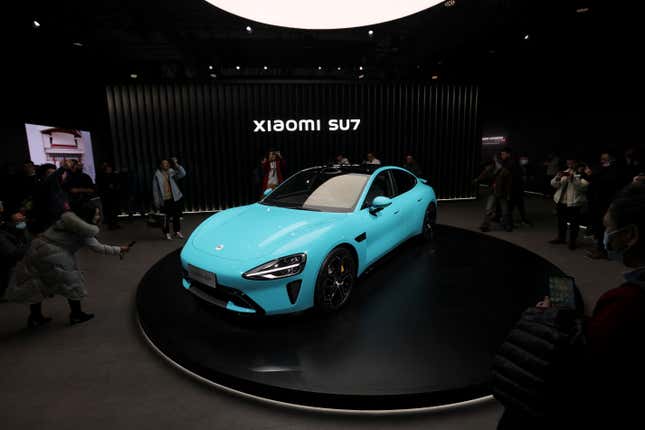
A new competitor is driving headfirst into China’s electric vehicle market, launching with a direct challenge against Elon Musk’s Tesla and taking shots at Apple.
On Thursday, Xiaomi held a launch event, emceed by co-founder Lei Jun, where the Chinese smartphone maker revealed its strategy for the SU7 sedan, its first-ever EV. The company expects to start delivering the model en-masse by the end of April and offering free bonuses, such as a built-in fridge.
The base model SU7 will cost 215,900 yuan ($29,900), while more expensive trims can reach up to 299,900 yuan ($41,496); that means each vehicle will be sold at a loss, Lei acknowledged.
Lei told a crowd in Beijing that Xiaomi had benchmarked itself against Tesla’s Model 3 electric compact and sought to match Porsche’s electric Taycan with its top-performance trim, the SU7 Max. The base SU7 is about $4,000 cheaper than the Model 3, which starts at 245,900 yuan ($34,020) in China.
“Tesla is a role model for all EVs in the world, so let’s do a comparison between us,” Lei said before showing the crowd a chart comparing the Model 3 and SU7. He said the SU7 beat Tesla in all but two aspects, adding that Xiaomi might need between three and five years to catch up.
The Beijing-based company is just the latest to get involved in China’s burgeoning EV market, which is seeing an ongoing price war led by Shenzhen-based BYD and Tesla. Xiaomi aims to become a top global carmaker in 15 to 20 years, Lei said last December.
The company has pledged to invest $10 billion to produce cars over a decade, and last year, it became one of the few new players in China’s EV market to win government approval. The SU7 will be made by BAIC Group, a state-owned automaker, in a Beijing facility capable of building 200,000 EVs annually.
Xiaomi sees EVs as an opportunity to expand its business beyond the consumer technology and smartphones it’s known for. Cupertino, California-based Apple had seen a similar opportunity but canceled its “Project Titan” last month after a decade of work.
“I didn’t expect Apple to quit,” Lei said Thursday, later adding, “Xiaomi will support Apple users just as well.”
Xiaomi stock surged 10% in Hong Kong on Thursday. Tesla stock is down 1% in trading Thursday and has dropped nearly 29% this year as it deals with several setbacks and rival BYD’s growth.